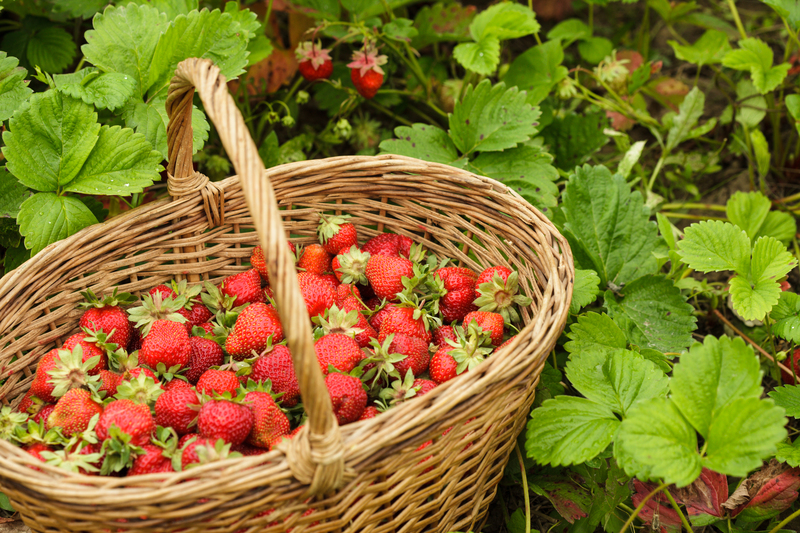Optimize Your Garden with These 3 Weed Control Tips
Posted on 19/09/2025
Optimize Your Garden with These 3 Weed Control Tips
Do you dream of a flourishing garden free from the persistent threat of weeds? Weeds can rapidly overtake precious vegetables, crowd out vibrant flowers, and diminish the aesthetic of any home landscape. If you're determined to optimize your garden and keep it beautiful all season long, it's essential to make weed control a top priority. In this comprehensive guide, you'll discover three highly effective weed management strategies that can transform your approach and maximize your gardening success.
Understanding the Importance of Weed Control for Garden Optimization
Before diving into practical tips, let's explore why weed control is pivotal for your garden's health and aesthetics. Weeds aggressively compete with desired plants for sunlight, water, and nutrients. Unchecked, they hamper plant growth, invite pests, and contribute to disease. An optimized, weed-free garden not only looks attractive but also produces healthier plants and more abundant harvests.
- Improved yield: Fewer weeds mean your vegetables and flowers aren't forced to compete for resources.
- Less pest habitat: Weeds can harbor pests and pathogens that threaten your chosen plants.
- Easier maintenance: A proactive weed management plan saves you time, money, and effort throughout the season.
- Enhanced curb appeal: A clean, weed-free landscape stands out and adds real value to your property.
Now, let's dive into three proven weed control tips to optimize your garden!

Tip 1: Mulch Smart for Maximum Weed Suppression
Mulching is lauded as one of the most effective and eco-friendly weed control methods. Mulch forms a protective barrier over the soil, blocking sunlight and preventing unwanted weed seeds from germinating and growing. This strategy is both simple and highly effective for garden optimization.
Types of Mulch for Optimal Weed Control
- Organic Mulch: Includes shredded leaves, straw, wood chips, bark, compost, or grass clippings. These materials not only suppress weeds but also improve soil fertility as they decompose.
- Inorganic Mulch: Materials such as landscape fabric, black plastic, or stones. These are excellent for areas where long-term weed barriers are necessary, such as driveways or perennial beds.
How to Apply Mulch Properly
- Prepare the bed: Before laying down mulch, remove existing weeds and smooth out the soil.
- Layer the mulch: Aim for 2-4 inches of organic mulch. Too thin a layer won't block light; too thick can suffocate your plants or prevent water penetration.
- Keep a clear zone around plant stems. Piling mulch against stems or trunks can cause rot and invite pests.
- Monitor and refresh mulch as needed. Organic mulch breaks down over time, so top up once or twice a year.
Mulching is not just about defeating weeds--it also retains moisture, regulates soil temperature, and beautifies your garden beds. This makes it a cornerstone practice for anyone looking to optimize weed control in their garden.
Tip 2: Adopt Proactive Garden Maintenance
Consistent, proactive care is at the heart of successful weed management. Weeds germinate and spread quickly, so addressing them before they become established is crucial for garden optimization.
Regular Weeding Routines
- Frequent hand-pulling: Pull weeds as soon as you see them, especially after rainfall when the soil is loose. Use a hoe or hand tool to extract roots to prevent regrowth.
- Inspect boundaries and pathways: These areas often harbor weed invasions. Keep them tidy to prevent weeds from migrating into your garden beds.
- Remove weeds before they seed: Many weeds reproduce quickly. If pulled before flowering and seeding, weed populations are drastically reduced.
Cultivate Dense Plantings
An often-overlooked method of weed prevention is to outcompete weeds with thick, healthy plantings. Dense groupings of your favorite flowers, vegetables, or groundcovers create a living mulch, leaving little space for weed seeds to thrive.
- Use cover crops: In vegetable gardens, sow cover crops like clover or rye between seasons to suppress weed growth and enhance fertility.
- Practice companion planting: Pair compatible flowers and vegetables closely together to form a dense canopy, further blocking sunlight from weed seeds.
Irrigate Wisely
Direct water only to your intended plants using drip irrigation or soaker hoses. Watering the whole garden surface invites weed seeds to germinate everywhere. By keeping water focused, you nourish your crops while starving out weeds.
The takeaway? Stay vigilant. Early and routine action keeps weeds small, easy to manage, and prevents a full-blown infestation.
Tip 3: Utilize Physical and Natural Barriers
Physical weed barriers offer an additional layer of protection for optimizing garden health. They block weed seeds from accessing your soil, reducing the work required over the season.
Landscape Fabric and Plastic Sheeting
- Landscape fabric: A woven material that allows water and air through but blocks weeds. Cut it to fit beds, then secure with pins. Top with mulch for appearance and insulation.
- Plastic sheets: Especially useful for vegetable rows or pathways, black plastic not only prevents weed growth but warms the soil for earlier planting. Be cautious: plastic can restrict air and water exchange, so only use in places where this won't harm desirable plants.
Living Weed Barrier Plants
Some groundcovers and ornamental plants are exceptional at outcompeting weeds:
- Creeping thyme: Low-growing and fragrant, it spreads quickly and chokes out weeds between pavers or along garden edges.
- Sedum: Ideal for sunny, dry spots, this succulent groundcover smothers weeds while requiring minimal care.
- Ajuga or bugleweed: Attractive foliage and flowers, rapidly creating dense mats resistant to weed intrusion.
Edging and Raised Beds
Physical structures can limit weed migration into your garden spaces:
- Install edging: Metal, plastic, or stone edging helps contain your beds and block spreading grass or encroaching weeds.
- Build raised beds: They not only elevate visual interest but also make it harder for aggressive perennials and annual weeds to invade the growing space.
These barriers work hand-in-hand with proper planting and mulching: By reinforcing your garden's defenses, you further minimize the amount of time and effort needed for weed control.
Bonus: Avoid Chemical Overload--Try Organic or DIY Weed Controls
While commercial herbicides can seem convenient, chemical weed killers carry significant risks. They often damage beneficial soil microbes, harm pollinators, and contaminate waterways. To create a healthy, sustainable environment, consider these DIY and organic weed control tips:
- Boiling water: Pour directly on weeds in driveways or walkways to kill them at the root.
- Vinegar solution: Mix white vinegar with a dash of dish soap and spray onto weeds (avoid contact with your crops).
- Corn gluten meal: This natural pre-emergent inhibits seed germination--sprinkle in susceptible areas early in the season.
- Cardboard or newspaper layers: Lay down sheets under mulch for extra protection; they block sunlight to buried weed seeds and break down into the soil.
The goal: Eliminate unwanted weeds in your garden, without compromising soil health, water quality, or local wildlife.

FAQs About Effective Garden Weed Control
How often should I weed my garden?- It depends on the season and climate, but weekly inspections and spot-weeding are ideal. Early, proactive efforts keep weed populations under control and prevent seeding.
- Organic mulches like wood chips, shredded bark, or straw are highly effective and add nutrients to the soil. For stubborn perennial weeds, consider combining with landscape fabric.
- While chemical herbicides are available, organic and physical methods are safer for your garden and the environment. Rely on mulching, barriers, hand-weeding, and organic pre-emergents whenever possible.
Final Thoughts: Optimize Your Garden with Thoughtful Weed Prevention
A truly optimized garden isn't just about beautiful blooms and robust vegetables--it's about creating a balanced ecosystem where weeds rarely get a foothold.
By combining smart mulching techniques, vigilant maintenance, and strong physical barriers, you'll set the stage for a healthier, more productive, and attractive garden. This not only saves time and effort throughout the season but also helps your chosen plants thrive.
- Start with mulch--the undeniable champion of weed control.
- Stay proactive--frequent, early intervention keeps weeds manageable.
- Reinforce with barriers--prevent new infestations from taking root.
Implement these three weed control tips, and watch your garden transform into the lush, optimized paradise you've always envisioned.
For more expert gardening advice, seasonal tips, and inspiration, subscribe to our newsletter or browse other articles on organic gardening and landscape optimization. Happy gardening!
Latest Posts
Innovative Ideas for Garden Seating Areas You'll Love
Weathering the Storm: Protecting Gardens from Wind
Optimize Your Garden with These 3 Weed Control Tips
Planting the Seeds for a Kid-Focused Garden
Winter Warriors: How to Equip Your Garden for the Cold Months

